|
Radiation Therapy Side Effects and Ways to Manage Them
Diarrhea
Fatigue
Hair Loss
Mouth Changes
Nausea and Vomiting
Sexual and Fertility Changes
Skin Changes
Throat Changes
Urinary and Bladder Changes
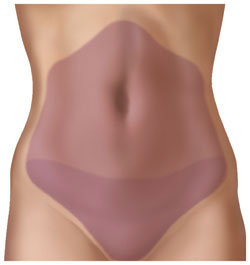
Radiation to the shaded area may
cause diarrhea.
|
What it is
Diarrhea is frequent bowel movements which may be soft,
formed, loose, or watery. Diarrhea can occur at any time
during radiation therapy.
Why it occurs
Radiation therapy to the pelvis, stomach, and abdomen
can cause diarrhea. People get diarrhea because radiation
harms the healthy cells in the large and small bowels.
These areas are very sensitive to the amount of radiation
needed to treat cancer.
Ways to manage
When you have diarrhea:
- Drink 8 to 12 cups of clear liquid per day. See
"Clear Liquids"
for ideas of drinks and foods
that are clear liquids.
If you drink liquids that are high in sugar (such as fruit juice, sweet iced tea,
Kool-Aid®, or Hi-C®) ask your nurse or dietitian if you should mix them with water.
- Eat many small meals and snacks. For instance, eat 5 or 6 small meals and snacks
rather than 3 large meals.
- Eat foods that are easy on the stomach (which means foods that are low in fiber, fat,
and lactose). See
"Foods and Drinks That Are Easy on the Stomach"
for other ideas of foods that are easy on the stomach. If your
diarrhea is severe, your doctor or nurse may suggest the BRAT diet, which stands for
bananas, rice, applesauce, and toast.

-
 Take care of your rectal area. Instead of toilet paper, use a baby
wipe or squirt of water from a spray bottle to clean yourself after
bowel movements. Also, ask your nurse about taking sitz baths,
which is a warm-water bath taken in a sitting position that covers
only the hips and buttocks. Be sure to tell your doctor or nurse if
your rectal area gets sore.
Take care of your rectal area. Instead of toilet paper, use a baby
wipe or squirt of water from a spray bottle to clean yourself after
bowel movements. Also, ask your nurse about taking sitz baths,
which is a warm-water bath taken in a sitting position that covers
only the hips and buttocks. Be sure to tell your doctor or nurse if
your rectal area gets sore.
- Stay away from:
- Milk and dairy foods, such as ice cream, sour cream, and cheese
- Spicy foods, such as hot sauce, salsa, chili, and curry dishes
- Foods or drinks with caffeine, such as regular coffee, black tea, soda, and chocolate
- Foods or drinks that cause gas, such as cooked dried beans, cabbage, broccoli, soy milk, and other soy products
- Foods that are high in fiber, such as raw fruits and vegetables, cooked dried beans, and whole wheat breads and cereals
- Fried or greasy foods
- Food from fast food restaurants
- Talk to your doctor or nurse. Tell them if you are having diarrhea. He or she
will suggest ways to manage it. He or she may also suggest taking medicine, such
as Imodium®.

To learn more about dealing with diarrhea during cancer treatment, see
Eating Hints, a book
from the National Cancer Institute. You can get a free copy at www.cancer.gov/publications
or 1-800-4-CANCER.
|
Fatigue is a common
side effect, and there
is a good chance that
you will feel some
level of fatigue from
radiation therapy.
|
What it is
Fatigue from radiation therapy can range from a mild to
an extreme feeling of being tired. Many people describe
fatigue as feeling weak, weary, worn out, heavy, or slow.
Why it occurs
 Fatigue can happen for many reasons. These include:
Fatigue can happen for many reasons. These include:
- Anemia
- Anxiety
- Depression
- Infection
- Lack of activity
- Medicines
Fatigue can also come from the effort of going to radiation therapy each day or from
stress. Most of the time, you will not know why you feel fatigue.
How long it lasts
When you first feel fatigue depends on a few factors, which include your age, health, level
of activity, and how you felt before radiation therapy started.
Fatigue can last from 6 weeks to 12 months after your last radiation therapy session. Some
people may always feel fatigue and, even after radiation therapy is over, will not have as
much energy as they did before.
Ways to manage
-
 Try to sleep at least 8 hours each night. This may be more sleep
than you needed before radiation therapy. One way to sleep better
at night is to be active during the day. For example, you could go
for walks, do yoga, or ride a bike. Another way to sleep better at
night is to relax before going to bed. You might read a book, work
on a jigsaw puzzle, listen to music, or do other calming hobbies.
Try to sleep at least 8 hours each night. This may be more sleep
than you needed before radiation therapy. One way to sleep better
at night is to be active during the day. For example, you could go
for walks, do yoga, or ride a bike. Another way to sleep better at
night is to relax before going to bed. You might read a book, work
on a jigsaw puzzle, listen to music, or do other calming hobbies.
-
Plan time to rest. You may need to nap during the day. Many people say that it helps to
rest for just 10 to 15 minutes. If you do nap, try to sleep for less than 1 hour at a time.
-
Try not to do too much. With fatigue, you may not have enough energy to do all the
things you want to do. Stay active, but choose the activities that are most important to
you. For example, you might go to work but not do housework, or watch your
children's sports events but not go out to dinner.
- Exercise. Most people feel better when they get some exercise each day. Go for a
15- to 30-minute walk or do stretches or yoga. Talk with your doctor or nurse about
how much exercise you can do while having radiation therapy.
- Plan a work schedule that is right for you. Fatigue may affect the amount of energy
you have for your job. You may feel well enough to work your full schedule, or you
may need to work less - maybe just a few hours a day or a few days each week. You
may want to talk with your boss about ways to work from home so you do not have to
commute. And you may want to think about going on medical leave while you have
radiation therapy.
- Plan a radiation therapy schedule that makes sense for you. You may want to schedule
your radiation therapy around your work or family schedule. For example, you might
want to have radiation therapy in the morning so you can go to work in the afternoon.
- Let others help you at home. Check with your insurance company to see whether it
covers home care services. You can also ask family members and friends to help when
you feel fatigue. Home care staff, family members, and friends can assist with
household chores, running errands, or driving you to and from radiation therapy
visits. They might also help by cooking meals for you to eat now or freeze for later.
- Learn from others who have cancer. People who have cancer can help each other by
sharing ways to manage fatigue. One way to meet other people with cancer is by
joining a support group - either in person or online. Talk with your doctor or nurse to
learn more about support groups.
- Talk with your doctor or nurse. If you have trouble dealing with fatigue, your doctor
may prescribe medicine (called psychostimulants) that can help decrease fatigue, give
you a sense of well-being, and increase your appetite. Your doctor may also suggest
treatments if you have anemia, depression, or are not able to sleep at night.
What it is
Hair loss (also called alopecia) is when some or all of your hair falls out.
Why it occurs
Radiation therapy can cause hair loss because it damages cells that grow quickly, such as
those in your hair roots.
Hair loss from radiation therapy only happens on the part of your body being treated.
This is not the same as hair loss from chemotherapy, which happens all over your body.
For instance, you may lose some or all of the hair on your head when you get radiation to
your brain. But if you get radiation to your hip, you may lose pubic hair (between your
legs) but not the hair on your head.
How long it lasts
You may start losing hair in your treatment area 2 to 3 weeks after your first radiation
therapy session. It takes about a week for all the hair in your treatment area to fall out.
Your hair may grow back 3 to 6 months after treatment is over. Sometimes, though, the
dose of radiation is so high that your hair never grows back.
Once your hair starts to grow back, it may not look or feel the way it did before. Your hair
may be thinner, or curly instead of straight. Or it may be darker or lighter in color than it
was before.
Ways to manage hair loss on your head
Before hair loss:
- Decide whether to cut your hair or shave your head. You may feel more in control of
hair loss when you plan ahead. Use an electric razor to prevent nicking yourself if you
decide to shave your head.
 If you plan to buy a wig, do so while you still have
hair. The best time to select your wig is before
radiation therapy begins or soon after it starts. This
way, the wig will match the color and style of your own
hair. Some people take their wig to their hair stylist.
You will want to have your wig fitted once you have lost
your hair. Make sure to choose a wig that feels
comfortable and does not hurt your scalp.
If you plan to buy a wig, do so while you still have
hair. The best time to select your wig is before
radiation therapy begins or soon after it starts. This
way, the wig will match the color and style of your own
hair. Some people take their wig to their hair stylist.
You will want to have your wig fitted once you have lost
your hair. Make sure to choose a wig that feels
comfortable and does not hurt your scalp.
- Check with your health insurance company to see whether it will pay for your wig.
If it does not, you can deduct the cost of your wig as a medical expense on your
income taxes. Some groups also sponsor free wig banks. Ask your doctor, nurse, or
social worker if he or she can refer you to a free wig bank in your area.
- Be gentle when you wash your hair. Use a mild shampoo, such as a baby shampoo.
Dry your hair by patting (not rubbing) it with a soft towel.
- Do not use curling irons, electric hair dryers, curlers, hair bands, clips, or hair sprays.
These can hurt your scalp or cause early hair loss.
- Do not use products that are harsh on your hair. These include hair colors, perms, gels,
mousse, oil, grease, or pomade.
After hair loss:
-
 Protect your scalp. Your scalp may feel tender after hair loss.
Cover your head with a hat, turban, or scarf when you are outside.
Try not to be in places where the temperature is very cold or very
hot. This means staying away from the direct sun, sun lamps, and
very cold air.
Protect your scalp. Your scalp may feel tender after hair loss.
Cover your head with a hat, turban, or scarf when you are outside.
Try not to be in places where the temperature is very cold or very
hot. This means staying away from the direct sun, sun lamps, and
very cold air.
- Stay warm. Your hair helps keep you warm, so you may feel colder once you lose it.
You can stay warmer by wearing a hat, turban, scarf, or wig.
|
You will lose hair only on
the part of your body
being treated.
|
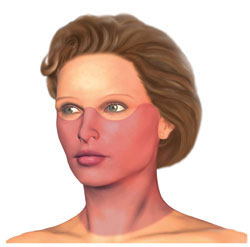
Radiation to the shaded area may cause mouth changes.
|
What they are
Radiation therapy to the head or neck can cause problems such as:
- Mouth sores (little cuts or ulcers in your mouth)
- Dry mouth (also called xerostomia) and throat
- Loss of taste
- Tooth decay
- Changes in taste (such as a metallic taste when you eat meat)
- Infections of your gums, teeth, or tongue
- Jaw stiffness and bone changes
- Thick, rope-like saliva
Why they occur
Radiation therapy kills cancer cells and can also damage healthy cells such as those in the
glands that make saliva and the soft, moist lining of your mouth.
How long they last
Some problems, like mouth sores, may go away after treatment ends. Others, such as taste
changes, may last for months or even years. Some problems, like dry mouth, may never
go away.
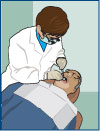
|
Visit a dentist at least
2 weeks before starting radiation
therapy to your head or neck.
|
Ways to manage
-
 If you are getting radiation therapy to your head or neck, visit a dentist at least 2
weeks before treatment starts. At this time, your dentist will examine your teeth and
mouth and do any needed dental work to make sure your mouth
is as healthy as possible before radiation therapy. If you cannot
get to the dentist before treatment starts, ask your doctor if you
should schedule a visit soon after treatment begins.
If you are getting radiation therapy to your head or neck, visit a dentist at least 2
weeks before treatment starts. At this time, your dentist will examine your teeth and
mouth and do any needed dental work to make sure your mouth
is as healthy as possible before radiation therapy. If you cannot
get to the dentist before treatment starts, ask your doctor if you
should schedule a visit soon after treatment begins.
-
Check your mouth every day. This way, you can see or feel
problems as soon as they start. Problems can include mouth
sores, white patches, or infection.
- Keep your mouth moist. You can do this by:
- Sipping water often during the day
- Sucking on ice chips
- Chewing sugar-free gum or sucking on sugar-free hard candy
- Using a saliva substitute to help moisten your mouth
- Asking your doctor to prescribe medicine that helps
increase saliva
- Clean your mouth, teeth, gums, and tongue.
- Brush your teeth, gums, and tongue after every meal and
at bedtime.
- Use an extra-soft toothbrush. You can make the bristles
softer by running warm water over them just before
you brush.
- Use a fluoride toothpaste.
- Use a special fluoride gel that your dentist can prescribe.
- Do not use mouthwashes that contain alcohol.
- Gently floss your teeth every day. If your gums bleed or
hurt, avoid those areas but floss your other teeth.
- Rinse your mouth every 1 to 2 hours with a solution of
1/4 teaspoon baking soda and 1/8 teaspoon salt mixed in
1 cup of warm water.
- If you have dentures, make sure they fit well and limit how
long you wear them each day. If you lose weight, your
dentist may need to adjust them.
- Keep your dentures clean by soaking or brushing them
each day.
- Be careful what you eat when your mouth is sore.
- Choose foods that are easy to chew and swallow.
- Take small bites, chew slowly, and sip liquids with your meals.
- Eat moist, soft foods such as cooked cereals, mashed potatoes, and scrambled eggs.
- Wet and soften food with gravy, sauce, broth, yogurt, or other liquids.
- Eat foods that are warm or at room temperature.
- Stay away from things that can hurt, scrape, or burn your mouth, such as:
- Sharp, crunchy foods such as potato or corn chips
- Hot foods
- Spicy foods such as hot sauce, curry dishes, salsa, and chili
- Fruits and juices that are high in acid such as tomatoes, oranges, lemons,
and grapefruits
- Toothpicks or other
sharp objects
- All tobacco products,
including cigarettes, pipes,
cigars, and chewing tobacco
- Drinks that contain alcohol
- Stay away from foods and drinks that are high in sugar. Foods and drinks that have a
lot sugar (such as regular soda, gum, and candy) can cause tooth decay.
-
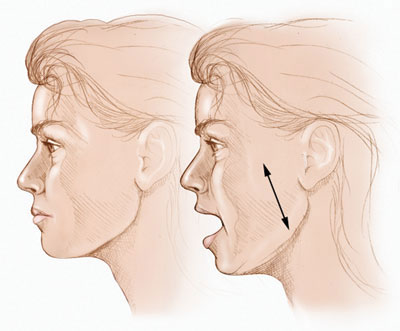
Exercise your jaw 3 times a day.
|
Exercise your jaw muscles.
Open and close your mouth 20 times as
far as you can without causing pain. Do
this exercise 3 times a day, even if your
jaw isn't stiff.
- Medicine. Ask your doctor or nurse about medicines that can protect your saliva
glands and the moist tissues that line your mouth.
- Call your doctor or nurse when your mouth hurts. There are medicines and other
products, such as mouth gels, that can help control mouth pain.
- You will need to take extra good care of your mouth for the rest of your life. Ask your
dentist how often you will need dental check-ups and how best to take care of your
teeth and mouth after radiation therapy is over.
|
Do not use tobacco or drink alcohol
while you are getting radiation therapy
to your head or neck.
|
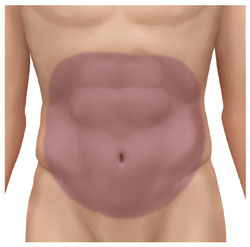
Radiation to the shaded area may cause nausea and vomiting.
|
What they are
Radiation therapy can cause nausea, vomiting, or both.
Nausea is when you feel sick to your stomach and feel like
you are going to throw up. Vomiting is when you throw
up food and fluids. You may also have dry heaves, which
happen when your body tries to vomit even though your
stomach is empty.
Why they occur
Nausea and vomiting can occur after radiation therapy to
the stomach, small intestine, colon, or parts of the brain.
Your risk for nausea and vomiting depends on how much
radiation you are getting, how much of your body is in
the treatment area, and whether you are also having
chemotherapy.
How long they last
Nausea and vomiting may occur 30 minutes to many hours after your radiation therapy
session ends. You are likely to feel better on days that you do not have radiation therapy.
Ways to manage
- Prevent nausea. The best way to keep from vomiting is to prevent nausea. One way to
do this is by having bland, easy-to-digest foods and drinks that do not upset your
stomach. These include toast, gelatin, and apple juice. To learn more, see the list of
Foods and Drinks That Are Easy on the Stomach.
-
 Try to relax before treatment. You may feel less nausea if you
relax before each radiation therapy treatment. You can do
this by spending time doing activities you enjoy, such as
reading a book, listening to music, or other hobbies.
Try to relax before treatment. You may feel less nausea if you
relax before each radiation therapy treatment. You can do
this by spending time doing activities you enjoy, such as
reading a book, listening to music, or other hobbies.
- Plan when to eat and drink. Some people feel better when they eat before radiation
therapy; others do not. Learn the best time for you to eat and drink. For example, you
might want a snack of crackers and apple juice 1 to 2 hours before radiation therapy.
Or, you might feel better if you have treatment on an empty stomach, which means not
eating 2 to 3 hours before treatment.
- Eat small meals and snacks. Instead of eating 3
large meals each day, you may want to eat 5 or 6
small meals and snacks. Make sure to eat slowly
and do not rush.
- Have foods and drinks that are warm or cool
(not hot or cold). Before eating or drinking, let hot food and drinks cool down and
cold food and drinks warm up.
-
 Talk with your doctor or nurse. He or she may suggest a
special diet of foods to eat or prescribe medicine to help
prevent nausea, which you can take 1 hour before each
radiation therapy session. You might also ask your doctor
or nurse about acupuncture, which may help relieve nausea
and vomiting caused by cancer treatment.
Talk with your doctor or nurse. He or she may suggest a
special diet of foods to eat or prescribe medicine to help
prevent nausea, which you can take 1 hour before each
radiation therapy session. You might also ask your doctor
or nurse about acupuncture, which may help relieve nausea
and vomiting caused by cancer treatment.
|
Eat 5 or 6 small meals and
snacks each day instead
of 3 large meals.
|
|
Learn more from Eating Hints, a book from the
National Cancer Institute.
To get a free copy,
contact the Cancer
Information Service.
|
What they are
Radiation therapy sometimes causes sexual changes, which can include hormone changes
and loss of interest in or ability to have sex. It can also affect fertility during and after
radiation therapy. For a woman, this means that she might not be able to get pregnant and
have a baby. For a man, this means that he might not be able to get a woman pregnant.
Sexual and fertility changes differ for men and women.
|
Be sure to tell your doctor if you are pregnant
before you start radiation therapy.
|
Problems for women include:
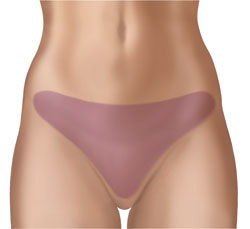
Radiation to the shaded area may cause sexual and fertility changes.
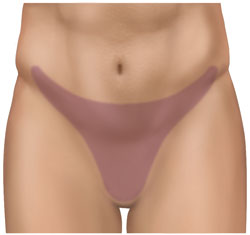
|
- Pain or discomfort when having sex
- Vaginal itching, burning, dryness, or atrophy (when
the muscles in the vagina become weak and the walls
of the vagina become thin)
- Vaginal stenosis, when the vagina becomes less elastic,
narrows, and gets shorter
- Symptoms of menopause for women not yet in
menopause. These include hot flashes, vaginal dryness,
and not having your period.
- Not being able to get pregnant after radiation therapy
is over
Problems for men include:
- Impotence (also called erectile dysfunction or ED),
which means not being able to have or keep an
erection
- Not being able to get a woman pregnant after radiation
therapy is over due to fewer or less effective sperm
Why they occur
Sexual and fertility changes can happen when people get radiation therapy to the pelvic
area. For women, this includes radiation to the vagina, uterus, or ovaries. For men, this
includes radiation to the testicles or prostate. Many sexual side effects are caused by scar
tissue from radiation therapy. Other problems, such as fatigue, pain, anxiety, or
depression, can affect your interest in having sex.
How long they last
After radiation therapy is over, most people want to have sex as much as they did before
treatment. Many sexual side effects go away after treatment ends. But you may have
problems with hormone changes and fertility for the rest of your life. If you are able to get
pregnant or father a child after you have finished radiation therapy, it should not affect the
health of the baby.
Ways to manage
 For both men and women, it is important to be open and
honest with your spouse or partner about your feelings,
concerns, and how you prefer to be intimate while you are
getting radiation therapy.
For both men and women, it is important to be open and
honest with your spouse or partner about your feelings,
concerns, and how you prefer to be intimate while you are
getting radiation therapy.
For women, here are some issues to discuss with your doctor or nurse:
- Fertility. Before radiation therapy starts, let your doctor or nurse know if you think
you might want to get pregnant after your treatment ends. He or she can talk with you
about ways to preserve your fertility, such as preserving your eggs to use in the future.
- Sexual problems. You may or may not have sexual problems. Your doctor or nurse can
tell you about side effects you can expect and suggest ways for coping with them.
- Birth control. It is very important that you do not get pregnant while having radiation
therapy. Radiation therapy can hurt the fetus at all stages of pregnancy. If you have
not yet gone through menopause, talk with your doctor or nurse about birth control
and ways to keep from getting pregnant.
-
Pregnancy. Make sure to tell your doctor or nurse if you are already pregnant.
-
Stretching your vagina. Vaginal stenosis is a common problem for women who have
radiation therapy to the pelvis. This can make it painful to have sex. You can help by
stretching your vagina using a dilator (a device that gently stretches the tissues of the
vagina). Ask your doctor or nurse where to find a dilator and how to use it.
- Lubrication. Use a special lotion for your vagina (such as Replens®) once a day to keep
it moist. When you have sex, use a water- or mineral oil-based lubricant (such as K-Y
Jelly® or Astroglide®).
- Sex. Ask your doctor or nurse whether it is okay for you to have sex during radiation
therapy. Most women can have sex, but it is a good idea to ask and be sure. If sex is
painful due to vaginal dryness, you can use a water- or mineral oil-based lubricant.

|
Talk to your doctor or nurse
if you want to have
children in the future.
|
For men, here are some issues to discuss with your doctor or nurse:
- Fertility. Before you start radiation therapy, let your doctor or nurse know if you think
you might want to father children in the future. He or she may talk with you about
ways to preserve your fertility before treatment starts, such as banking your sperm.
Your sperm will need to be collected before you begin radiation therapy.
- Impotence. Your doctor or nurse can let you know whether you are likely to become
impotent and how long it might last. Your doctor can prescribe medicine or other
treatments that may help.
- Sex. Ask if it is okay for you to have sex during radiation therapy. Most men can have
sex, but it is a good idea to ask and be sure.

|
If you want to father children in the future,
your sperm will need to be collected before
you begin treatment.
|
What they are
Radiation therapy can cause skin changes in your treatment area. Here are some common
skin changes:
- Redness. Your skin in the treatment area may look as if you have a mild to severe
sunburn or tan. This can occur on any part of your body where you are getting
radiation.
- Pruritus. The skin in your treatment area may itch so much that you always feel like
scratching. This causes problems because scratching too much can lead to skin breakdown and infection.
- Dry and peeling skin. This is when the skin in your treatment area gets very dry -
much drier than normal. In fact, your skin may be so dry that it peels like it does after
a sunburn.
- Moist reaction. Radiation kills skin cells in your treatment area, causing your skin to
peel off faster than it can grow back. When this happens, you can get sores or ulcers.
The skin in your treatment area can also become wet, sore, or infected. This is more
common where you have skin folds, such as your buttocks, behind your ears, under
your breasts. It may also occur where your skin is very thin, such as your neck.
- Swollen skin. The skin in your treatment area may be swollen and puffy.
Why they occur
Radiation therapy causes skin cells to break down and die. When people get radiation
almost every day, their skin cells do not have enough time to grow back between
treatments. Skin changes can happen on any part of the body that gets radiation.
How long they last
 Skin changes may start a few weeks after you begin radiation therapy. Many of these
changes often go away a few weeks after treatment is over. But even after radiation therapy
ends, you may still have skin changes. Your treated skin may always
look darker and blotchy. It may feel very dry or thicker than before.
And you may always burn quickly and be sensitive to the sun. You will
always be at risk for skin cancer in the treatment area. Be sure to avoid
tanning beds and protect yourself from the sun by wearing a hat, long
sleeves, long pants, and sunscreen with an SPF of 30 or higher.
Skin changes may start a few weeks after you begin radiation therapy. Many of these
changes often go away a few weeks after treatment is over. But even after radiation therapy
ends, you may still have skin changes. Your treated skin may always
look darker and blotchy. It may feel very dry or thicker than before.
And you may always burn quickly and be sensitive to the sun. You will
always be at risk for skin cancer in the treatment area. Be sure to avoid
tanning beds and protect yourself from the sun by wearing a hat, long
sleeves, long pants, and sunscreen with an SPF of 30 or higher.
Ways to manage
- Skin care. Take extra good care of your
skin during radiation therapy. Be gentle
and do not rub, scrub, or scratch in the
treatment area. Also, use creams that your
doctor prescribes.
|
Take extra good care of your
skin during radiation therapy.
Be gentle and do not rub,
scrub, or scratch.
|
- Do not put anything on your skin that is
very hot or cold. This means not using heating pads, ice packs, or other hot or cold
items on the treatment area. It also means washing with lukewarm water.
- Be gentle when you shower or take a bath. You can take a lukewarm shower every
day. If you prefer to take a lukewarm bath, do so only every other day and soak for less
than 30 minutes. Whether you take a
shower or bath, make sure to use a mild
soap that does not have fragrance or
deodorant in it. Dry yourself with a soft
towel by patting, not rubbing, your skin.
Be careful not to wash off the ink markings
that you need for radiation therapy.
|
Be careful not to wash off the
ink markings you need for
radiation therapy.
|
-
Use only those lotions and skin products that your doctor or nurse suggests. If you
are using a prescribed cream for a skin problem or acne, you must tell your doctor or
nurse before you begin radiation treatment. Check with your doctor or nurse before
using any of the following skin products:
- Bubble bath
- Cornstarch
- Cream
- Deodorant
- Hair removers
- Makeup
|
 |
- Oil
- Ointment
- Perfume
- Powder
- Soap
- Sunscreen
|
If you use any skin products on days you have radiation therapy, use them at least
4 hours before your treatment session.
- Cool, humid places. Your skin may feel much better when you are in cool, humid
places. You can make rooms more humid by putting a bowl of water on the radiator or
using a humidifier. If you use a humidifier, be sure to follow the directions about
cleaning it to prevent bacteria.
- Soft fabrics. Wear clothes and use bed sheets that are soft, such as those made
from cotton.
- Do not wear clothes that are tight and do not breathe, such as girdles and pantyhose.
-
 Protect your skin from the sun every day. The sun can burn you even on cloudy days
or when you are outside for just a few minutes. Do not go to the
beach or sun bathe. Wear a broad-brimmed hat, long-sleeved shirt,
and long pants when you are outside. Talk with your doctor or nurse
about sunscreen lotions. He or she may suggest that you use a
sunscreen with an SPF of 30 or higher. You will need to protect your
skin from the sun even after radiation therapy is over, since you will
have an increased risk of skin cancer for the rest of your life.
Protect your skin from the sun every day. The sun can burn you even on cloudy days
or when you are outside for just a few minutes. Do not go to the
beach or sun bathe. Wear a broad-brimmed hat, long-sleeved shirt,
and long pants when you are outside. Talk with your doctor or nurse
about sunscreen lotions. He or she may suggest that you use a
sunscreen with an SPF of 30 or higher. You will need to protect your
skin from the sun even after radiation therapy is over, since you will
have an increased risk of skin cancer for the rest of your life.
- Do not use tanning beds. Tanning beds expose you to the same harmful effects as
the sun.
- Adhesive tape. Do not put bandages, BAND-AIDS®, or other types of sticky tape on
your skin in the treatment area. Talk with your doctor or nurse about ways to bandage
without tape.
- Shaving. Ask your doctor or nurse if you can shave the treated area. If you can shave,
use an electric razor and do not use pre-shave lotion.
-
 Rectal area. If you have radiation therapy to the rectal area, you
are likely to have skin problems. These problems are often worse
after a bowel movement. Clean yourself with a baby wipe or
squirt of water from a spray bottle. Also ask your nurse about sitz
baths (a warm-water bath taken in a sitting position that covers
only the hips and buttocks.)
Rectal area. If you have radiation therapy to the rectal area, you
are likely to have skin problems. These problems are often worse
after a bowel movement. Clean yourself with a baby wipe or
squirt of water from a spray bottle. Also ask your nurse about sitz
baths (a warm-water bath taken in a sitting position that covers
only the hips and buttocks.)
-
Talk with your doctor or nurse. Some skin changes can be very
serious. Your treatment team will check for skin changes
each time you have radiation therapy. Make sure to report
any skin changes that you notice.
 Medicine. Medicines can help with some skin changes.
They include lotions for dry or itchy skin, antibiotics to treat
infection, and other drugs to reduce swelling or itching.
Medicine. Medicines can help with some skin changes.
They include lotions for dry or itchy skin, antibiotics to treat
infection, and other drugs to reduce swelling or itching.
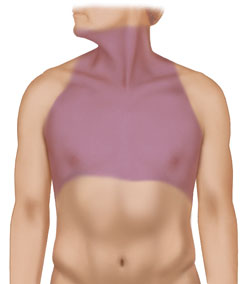
Radiation to the shaded area may cause throat changes.
|
What they are
Radiation therapy to the neck or chest can cause the lining of
your throat to become inflamed and sore. This is called
esophagitis. You may feel as if you have a lump in your
throat or burning in your chest or throat. You may also have
trouble swallowing.
Why they occur
Radiation therapy to the neck or chest can cause throat changes because it not only kills cancer
cells, but can also damage the healthy cells that line your throat. Your risk for throat changes
depends on how much radiation you are getting, whether you are also having chemotherapy,
and whether you use tobacco and alcohol while you are getting radiation therapy.
How long they last
You may notice throat changes 2 to 3 weeks after starting radiation. You will most likely
feel better 4 to 6 weeks after radiation therapy has finished.
Ways to manage
- Be careful what you eat when your throat is sore.
- Choose foods that are easy to swallow.
- Cut, blend, or shred foods to make them easier to eat.
- Eat moist, soft foods such as cooked cereals, mashed potatoes, and scrambled eggs.
- Wet and soften food with gravy, sauce, broth, yogurt, or other liquids.
- Drink cool drinks.
- Sip drinks through a straw.
- Eat foods that are cool or at room temperature.
- Eat small meals and snacks. It may be easier to eat a small amount of food at one
time. Instead of eating 3 large meals each day, you may want to eat 5 or 6 small meals
and snacks.
- Choose foods and drinks that are high in calories and protein. When it hurts to
swallow, you may eat less and lose weight. It is important to keep your weight the
same during radiation therapy. Having foods and drinks that are high in calories and
protein can help you. See the
chart of foods and drinks that are high in calories and
protein for ideas.
- Sit upright and bend your head slightly forward when you are eating or drinking.
Remain sitting or standing upright for at least 30 minutes after eating.
- Don't have things that can burn or scrape your throat, such as:
- Hot foods and drinks
- Spicy foods
- Foods and juices that are high in acid, such as tomatoes and oranges
- Sharp, crunchy foods such as potato or corn chips
- All tobacco products, such as cigarettes, pipes, cigars, and chewing tobacco
- Drinks that contain alcohol
- Talk with a dietitian. He or she can help make sure you eat enough to maintain your
weight. This may include choosing foods that are high in calories and protein and
foods that are easy to swallow.
- Talk with your doctor or nurse.
Let your doctor or nurse know if you
notice throat changes, such as trouble
swallowing, feeling as if you are choking,
or coughing while eating or drinking.
Also, let him or her know if you have
pain or lose any weight. Your doctor can
prescribe medicines that may help relieve
your symptoms, such as antacids, gels that
coat your throat, and pain killers.
Let your doctor or nurse know
if you:
- Have trouble swallowing
- Feel as if you are choking
- Cough while you are eatingor drinking
|
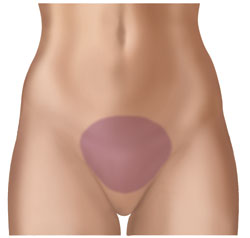
Radiation to the shaded area may cause urinary and bladder changes.
|
What they are
Radiation therapy can cause urinary and bladder problems,
which can include:
- Burning or pain when you begin to urinate or after you empty your bladder
- Trouble starting to urinate
- Trouble emptying your bladder
- Frequent, urgent need to urinate
- Cystitis, a swelling (inflammation) in your urinary tract
- Incontinence, when you cannot control the flow of urine from your bladder, especially when coughing or sneezing
- Frequent need to get up during sleep to urinate
- Blood in your urine
- Bladder spasms, which are like painful muscle cramps
Why they occur
Urinary and bladder problems may occur when people get radiation therapy to the
prostate or bladder. Radiation therapy can harm the healthy cells of the bladder wall and
urinary tract, which can cause inflammation, ulcers, and infection.
How long they last
Urinary and bladder problems often start 3 to 5 weeks after radiation therapy begins.
Most problems go away 2 to 8 weeks after treatment is over.
Ways to manage
- Drink a lot of fluids. This means 6 to 8 cups of fluids each
day. Drink enough fluids so that your urine is clear to light
yellow in color.
-
 Avoid coffee, black tea, alcohol, spices, and all
tobacco products.
Avoid coffee, black tea, alcohol, spices, and all
tobacco products.
-
Talk with your doctor or nurse if you think you have
urinary or bladder problems. He or she may ask for a
urine sample to make sure that you do not have an
infection.
-
 Talk to your doctor or nurse if you have incontinence.
He or she may refer you to a physical therapist who will
assess your problem. The therapist can give you exercises
to improve bladder control.
Talk to your doctor or nurse if you have incontinence.
He or she may refer you to a physical therapist who will
assess your problem. The therapist can give you exercises
to improve bladder control.
-
Medicine. Your doctor may prescribe antibiotics if your problems are caused by an
infection. Other medicines can help you urinate, reduce burning or pain, and ease
bladder spasms.
|
Drink 6 to 8 cups
of fluids each day.
|
Back to Top
< Previous Section | Next Section > |